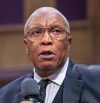I love the anthem of the civil rights movement, “We Shall Overcome.” The song presupposes that overcoming requires struggle. And as we approach another anniversary of the birth of Martin Luther King Jr., some of us will gather in multi-racial settings, hold hands and join in singing that song. But when the song is ended, we will go back to our respective lives believing that we have done something grand or significant, but neither will be the case if all we do is to recall some words and join hands and sing.
So many of us trivialize this time because we have mythologized the man and the times in which he lived. King was not mythic; he was a real human being who lived during an ugly time in America, particularly in the South. Racial segregation was prominent. African American people could not vote. They were not accorded the same dignity, humanity and respect as White citizens. Our constitutional rights were not merely violated, they were often denied. This was a period when African American citizens were terrorized and killed when they stood to press for their rights.
King understood so clearly that real community required the doing of justice. In fact, there can never be true brotherhood/sisterhood if justice is absent. So I will sing that anthem with many others this time around, but I will do so with a strong sense that to sing it is to open myself to be drawn into a struggle to open the vault of justice to immigrants south of our border, who want nothing more than a home where they and their children can live without fear, to gays who are asking that they be respected and honored for who they are and for whom they choose to love, and to black males who are demanding a justice system that is both fair and humane.
King said on a number of occasions that we must conform our lives to righteousness, and we do that as Paul reminds us in Romans 12 by being transformed by Jesus. We must be maladjusted to racism and bigotry, which really wounds all of us. There have been the deaths of Michael Brown in Ferguson, Eric Garner in New York, Dontre Hamilton in Milwaukee and Tamir Rice in Cleveland; all of them killed by White police officers who were not facing any real threat, which has given birth to a new movement across the nation under the banner “Black Lives Matter.”
And like the movement that began in the cradle of the South some 50 years ago, this movement is being energized by young people who represent every fabric of America. And even more powerful and like the civil rights movement, this movement has seen a strong presence of clergy and faith leaders representing a variety of traditions. Black and White, Asians, Latinos, American Indians, Christians and Muslims marching in the streets with hands up and chanting, “Black lives matter.” White pastors daring to preach boldly and faithfully a gospel that demands that we preach good news to the poor, the disenfranchised, and those who have been devalued in this country because of skin color. Pastors preaching that message even though they know there will be repercussions from some in their congregations.
Abraham Heschel, a rabbi, would join King and 25,000 others on that historic march from Selma to Montgomery. He said of that march that on that journey his feet were praying. On Jan. 19, I trust that we all will make a commitment to find a King celebration to attend where we can learn more about the man and the faith that shaped him, where we can gather as a community to pray together for healing and reconciliation, and where we can join hands and sing that great anthem, “We Shall Overcome.”
But this time, when the song is ended, I pray that we will be prepared to pray with our feet and to engage ourselves in the work of dismantling systems that dehumanize and oppress people.





